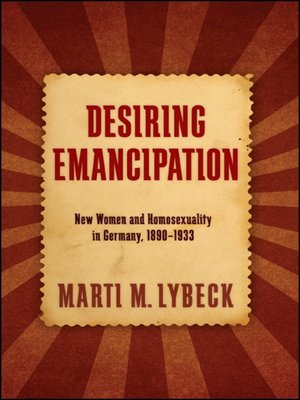Desiring Emancipation
ebook ∣ New Women and Homosexuality in Germany, 1890-1933 · SUNY series in Queer Politics and Cultures
By Marti M. Lybeck

Sign up to save your library
With an OverDrive account, you can save your favorite libraries for at-a-glance information about availability. Find out more about OverDrive accounts.
Find this title in Libby, the library reading app by OverDrive.



Search for a digital library with this title
Title found at these libraries:
| Loading... |
Desiring Emancipation traces middle-class German women's claims to gender emancipation and sexual subjectivity in the pre-Nazi era. The emergence of homosexual identities and concepts in this same time frame provided the context for expression of individual struggles with self, femininity, and sex. The book asks how women used new concepts and opportunities to construct selves in relationship to family, society, state, and culture. Taking a queer approach, Desiring Emancipation's goal is not to find homosexuals in history, but to analyze how women reworked categories of gender and sex. Marti M. Lybeck interrogates their desires, demonstrating that emancipation was fraught with conflict, anachronism, and disappointment.
Each chapter is a microhistorical recreation of the actions, writings, contexts, and conflicts of specific groups of women. The topics include the experience of first-generation university students, public debates about female homosexuality, and the stories of three civil servants whose careers were ruined by workplace accusations of homosexuality. The book concludes with a debate between the women who joined the 1920s homosexual movement on the meanings of their new identities.
Each chapter is a microhistorical recreation of the actions, writings, contexts, and conflicts of specific groups of women. The topics include the experience of first-generation university students, public debates about female homosexuality, and the stories of three civil servants whose careers were ruined by workplace accusations of homosexuality. The book concludes with a debate between the women who joined the 1920s homosexual movement on the meanings of their new identities.






